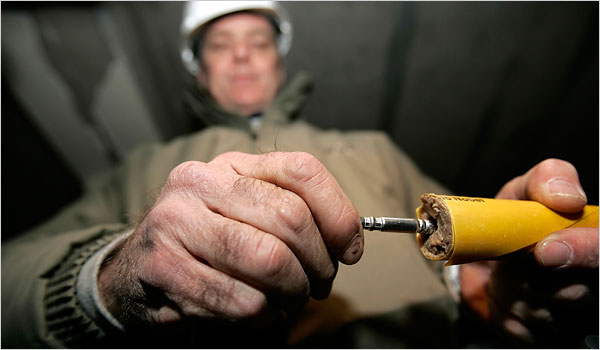
Doug Loizeaux at work. His family’s demolition business is the subject of one of David Samuels’s essays. (Danny Johnston/Associated Press)
ONLY LOVE CAN BREAK YOUR HEART
By David Samuels.
372 pp. The New Press. $26.95.
On long bus rides, David Samuels used to fake a Southern accent and tell strangers he was raised on Army bases rather than in the Orthodox Jewish household in Brooklyn where he grew up. “There was something scary about the ease with which I became a new person, a fictional character,” he has written. “I felt cold inside, and detached from my own body.” Eventually he started listening more carefully to the stories of his fellow travelers, spending much of the last 10 years on the road for Harper’s Magazine and The New Yorker, absorbing himself in the lives of a strange cross section of America: con men and fugitives, radicals and rap stars, addicts and politicians. Now we have his first collection of long-form journalism, a tribute to the twin American traditions of self-invention and self-deceit.
The book is full of scenes from our nation’s underbelly, including a washed-up Red Sox pitcher in Montreal, a family of demolition experts hired to bring down a Las Vegas casino and a California convention crawling with salesmen in the grip of a pyramid scheme. What these people have in common, as Samuels explains in the title essay on bettors at a Florida greyhound track, is some version of “the demonstrably mistaken and often quite dangerous idea that if you try hard and believe in yourself the laws of chance will be suspended.”
The source of both tragedy and humor here is the wide gap between the dreams that draw these men onward and the trail of disaster they leave behind. In upstate New York a concert promoter lays out his wispy vision for Woodstock 1999, where in fact young people will riot after camping out in their own sewage. In snow-covered Minnesota, Samuels finds addicts appealing to a higher power to prevent the next relapse, as a monkey in a nearby lab thumps his lever a thousand times for a single hit of crack cocaine.
The portraits that emerge are exhaustive and often severe, but there is something delicate in Samuels’s method. In his stories the random flow of events takes on real meaning, allowing us to see what’s hidden in plain view and to hear what isn’t being said. He has some of Joan Didion’s gift for stripping the layers away until a fraud is exposed. But even among the most unreliable of characters, he seems to be looking for someone to trust.
After the 9/11 attacks, Samuels began to search in vain for honest men in public office, first at the bombed-out Pentagon, where he found reporters demurring to a smug Donald Rumsfeld at the dawn of the “war on terror,” then at a mercenary fund-raising banquet on the 2004 Bush campaign trail in Texas. But the results are far richer when he turns his strict eye inward in a remarkable essay on his emergence from a boyish solitude into the sanctuary of a new marriage, cleverly folded into a tour of his block in Brooklyn in the months after the attacks. “It was as if the ashes from the tower had fertilized our neighborhood,” he writes.
In his other new book, “The Runner,” an expanded version of his ingeniously suspenseful New Yorker article about a bicycle thief who conned his way into Princeton, Samuels writes that a decade after the impostor was unmasked, he surfaced again in Colorado, up to his usual combination of fraud and theft. Perhaps we should not be surprised, then, that the author pulls a similar disappearing-reappearing act in his introduction, announcing first that the collection will serve as “my final goodbye to the dying industry that has paid my bills,” then that “I will continue writing for magazines” because “I don’t know any other kind of life.”
It’s an appropriately elastic maneuver from a brilliant reporter who has made a career of observing “our national gift for self-delusion and for making ourselves up from scratch,” as he puts it, “which is much the same thing as believing in the future.”
Jascha Hoffman writes frequently for Nature and The Times.